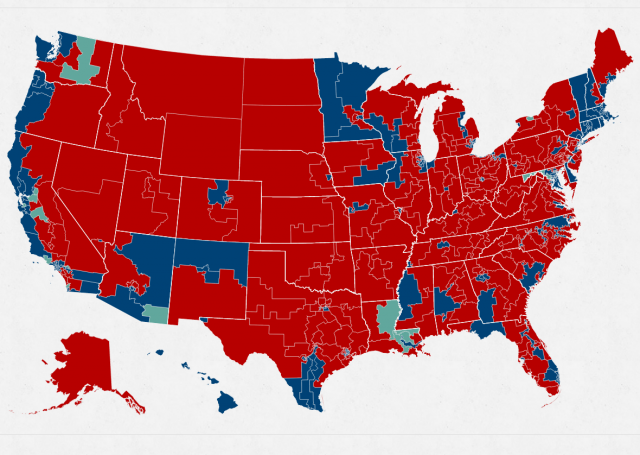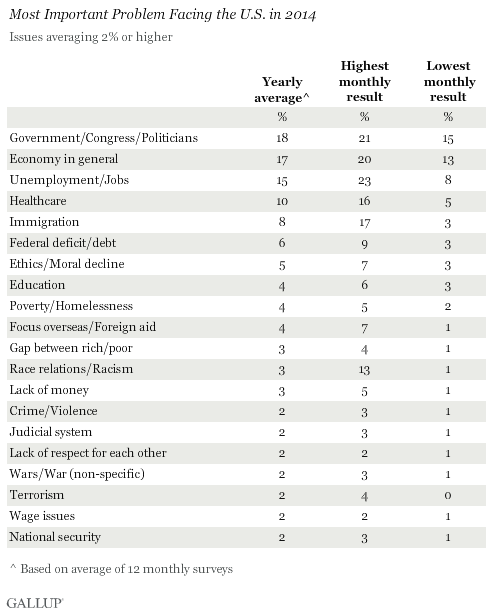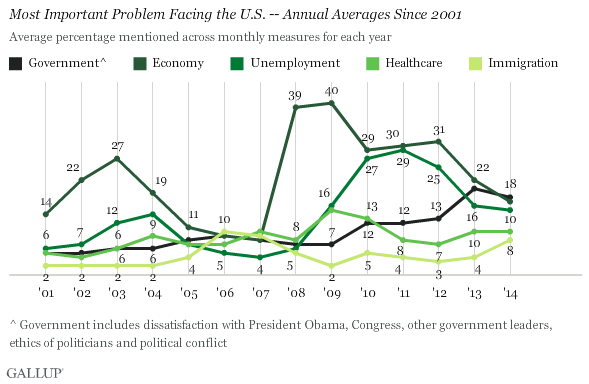What’s your top priority in 2016? Let this poll help you pick!
We’ve got 99 problems, and we can’t run on all of ’em.

Between the President’s executive orders, a spiraling health care delivery infrastructure, and a bloated welfare state, candidates gearing up for a run in 2016 have no shortage of material for stump speeches and e-mail blasts.
But, as anyone who has looked at the data from previous cycles knows, some issues move voters to the polls, while others move voters to remain on the couch rating movies on Netflix.
Willingness to prioritize issues has been a problem for the right at least as long as I’ve been involved in politics. We worry that strategically promoting, say, conservative economic policies, means that we’re somehow downplaying the importance of other issues such as abortion, immigration, or the country’s whirling moral compass.
I don’t have a solution to this problem; but as a strategist, when it comes to choosing which issues to throw on the front burner during a political campaign, I look to the data. A new poll by Gallup rounds up the top concerns of Americans in 2014, and offers valuable insight for those looking to get an early start on platform building.
2014 was unique in that over the course of the year, four issues dominated the conversation enough to break double digits in the percentage of people who thought that particular problem was the nation’s most troubling.
Gallup explains how the numbers have shifted:
Some of the issues troubling Americans received uneven attention during the year. In particular, mentions of unemployment were consistently higher in the first half of 2014 than later in the year, reaching 23% in February. Also, race relations, usually mentioned by no more than 2% of Americans as the nation’s top problem, surged to 13% in December as recent legal decisions sparked protests nationwide against police treatment of blacks. Similarly, mentions of immigration spiked in July to 17% as thousands of undocumented children from Central and South America created a crisis at the southern U.S. border. But this is the first time since 2001 that no single issue averaged 20% or more for the year.
Which issues are consistently at the top of everyone’s mind? The economy, jobs, and the government—all issues with easy, universal application, and all issues that conservatives can tackle head on without having to punt the moment a gender or race activist starts lobbing bombs.
Issues like health care, immigration, and education were also important to Americans in 2014; they made the list, even if they didn’t break through to the top 3. These kinds of issues, however, have the potential to run hot, and they’re best saved for more targeted outreach. The issues in the top 3, in contrast, are great issues to stump on when you’re trying to get to know the voters in whichever community you’re targeting.
Judging by my own experience, I can tell you that voters this cycle didn’t want to hear about how the economy affected them as minorities, or how the education system influenced their futures as women. They wanted to hear about how laws passed by Congress would affect their ability to put gas in the car, go to work, buy toilet paper, pay for the heat, and put food on the table. If we want to win in 2016, we need to come out of the gate with explanations and policies that address those concerns, as opposed to issues that immediately dare someone with an opposing opinion to have a problem with our candidates.
Gallup’s analysts express concern that the “dispersion of public concern” could make political messaging in the 2016 cycle more complex, and I think that’s true; but I also think that by focusing our efforts on what concerns Americans most, we can build a foundation for our messaging on other “red meat” issues that activists and local-level politicos like to sink their teeth in to.
In a nutshell, if we remember that the average voter is the polar opposite of the average politico, we’ll do just fine.
Donations tax deductible
to the full extent allowed by law.










Comments
Really? More people are worried about racism than terrorism?
Could be they are responding to the ‘race relations’ side of the issue rather than the ‘racism’. I’m certainly concerned about race relations, though it doesn’t approach my most important issue. ‘Racism’, not so much.
There are a couple of problems with a survey such as this. There is a significant difference between ‘race relations’ and ‘racism’ as issues, yet they are lumped together. Same with some of the other categories. Healthcare? Important but in what manner? Should the gov’t be doing more or less? You have no idea from the survey. In addition, since people can only make one response – the ‘most important’ – some issues may rank lower (or higher) than they should. I probably have 3 or 4 top rated issues which have no clear leader, yet the poll forces me to pick only one. I would prefer a poll asking for all the issues you consider ‘very important’, but hey, that’s just me.
Some issues are going to rise or fall based on the publicity the MSM chooses to give them, so those results are less meaningful as issues whose scores have less variability.
In short, campaign strategy should never be based on surveys such as this – nor on the the sort of surveys sent out with fund-raising letters. I would love to design a survey; it would have to go into much more detail. What issues you consider important long-term vs short term, which policy prescriptions are preferred, etc. Probably such surveys are done by campaigns but are not publicized. I’d love to see them in all their gory detail.
How a campaign/party should respond to the results of such a survey is another subject entirely.
There’s a second problem lurking below what you listed. People *say* they are concerned about different thing than they really are. Example from history: The OJ Simpson trial. Polls constantly said how sick we all were of the endless coverage, BUT the networks could see how many people were tuning in to watch, and there were lots of ’em.
Same thing for race relations. It constantly polls higher than reality because nobody wants to be branded a racist, even to an anonymous pollster. Same for Government. Everybody hates Congress, BUT nearly every politician running for reelection gets it. (except the last election.)
Racism is the current “fad”. Terrorism was so yesterday.
Global warming / catastrophic man-made climate change/disruption?
Anyone?
Anyone?
We’re all gonna die, people! Al Gore said so!
Now, now, let’s not exaggerate! It isn’t “everyone” it’s just a billion people…by 2020.
http://www.foxnews.com/science/2014/12/31/botched-environmental-predictions-for-2015/
About the only thing Al Gore is right about: We all are, at some point in time, going to die! How astute!
My footprint is bigger than Al Gore’s! {Sigh!} But it’s only because I wear a bigger shoe.
Every governor running for President will have had to file his state plan for a cronyistic economy as required under WIOA by July 1 of this year. It blends together community organizers and the chamber of commerce and involves both K-12 and higher ed. No one is wanting to talk about it because it is School to Work married to an Industrial Policy for political favorites and the currently disadvantaged.
http://www.invisibleserfscollar.com/doubling-down-on-deceit-managing-the-talent-pipeline-means-treating-students-as-mere-chattel/ is something that everyone everywhere needs to be familiar with. We are all certainly on the menu as the political class at all levels excitedly goes into dirigiste mode.
Fine comment, read your blog post, appreciate your blog. Thanks! 20 years ago wife and I helped drive homeschooling in our state. You illumine the activities of the first, most decisive stage of the Globalist project: school the generations into controllable widgets. DNI/NIC reveal later stages in their Trends of 2015 Report, linked and discussed here: http://theological-geography.net/?p=15325 A forlorn project, but they will not be quit of it until forced, so efforts such as yours are necessary and salutary.
This is a survey that tells us nothing. Gallup makes its own conclusions based on what it wants you to believe, and that is: everything is peachy and Obama is doing a wonderful job. “Government/Congress/Politicians” – answering this and any number of the others can come from all different perspectives. To liberals this is a problem because of those evil Republicans blocking their progressive agenda. For conservatives it’s a run-a-way system with no controls. For independents it’s whatever. So, everyone’s dissatisfied, just for different reasons. Does this and the other responses really help us understand anything? IMO: ignore it as worthless.
I want more information – the title of the post implies that we can pick our issues. Nope it is a Gallop poll of a mere 1000 people/month.
Ninety-nine issues – what are they? I am curious if there is a list or was that a number you pulled out of a hat.
The top five issues that are listed are very general – government, the economy, unemployment, healthcare, immigration. The issues on the bottom of the list are more specific. If you add up national security, terrorism, war, and foreign aid, you are at 10%. Add in immigration and it is 18% and at the top of the list.
Remember the three legged stool with foreign policy, social issues and economics as the legs? What would happen if we looked at an issue as a Venn diagram with three bubbles. Let’s see how much overlap there is and what is the size of each bubble.
Immigration – quick do a brainstorm session and come up with points. I came up with border security, violence at the border, people dying, trash, drugs, health issue of vaccination and communicable diseases, jobs and wages, social concerns of health access and payment, cost of welfare, cost of food stamps, education impact of increased students without the increased tax base to support, lack of blending in with the community which increases tensions, increased crime, lack of deportation for crimes and the injustice relating to those people who waited in line. I’m sure there are other issues – let’s list them. Then ask where the issue should be placed in the Venn diagram and what level of importance on a scale of 1-5.
This type of poll with supplemental information on geographic region, age, sex, education, religion, culture, urban vs rural, political leanings would give me more information on what is important to a political campaign.
We have a president that was a blank slate and people saw only what they wanted to see in the man. I don’t want that to happen again.
Might I offer that the biggest problem is that there is no nationwide, organized political force that will oppose the Left on ANY of those issues. It is “never the hill to die on”, or even stand and pretend to resist on. The Institutional Republicans will pass the Democrat agenda if the Democrats can’t. And will go to war with any who would fight the Democrats. The creation of a political opposition that will operate in electoral/legislative politics is the greatest crisis. Because the absence of an electoral/legislative opposition does not mean that there is no opposition. It means that opposition will have to find other outlets. And it will.
The Tea Party really kicked off with Santelli’s rant against big government bailouts. Polling consistently shows about two thirds want smaller more local government (federalism), less intrusion in our lives and affairs (liberty).
So of course BigGov had to attack the tea party grassroots movement, and either co-opt them or label them stupid racists and haters. Their success reveals what we are really up against. It is big money and big power, in media, unions, government … any group that would be harmed by returning power to “we the people”.
This labeling assault is a tried and true tactic, whether McCarthyites, racists, homophobes, Islamophobes … or now, “Tea baggers”. The left has nearly unlimited TV time to broadcast their PC branding of everything, and they have 10,000 bureaucrats like Lerner or Holder to act as hidden enforcers. Walker and Perry deal with rogue prosecutors, Cruz is isolated and “Palinized”, before any even announce a candidacy.
Part of any campaign has to be to reveal the Democrat “evil man behind the PC curtain” as an anti-America liar and con man. Obama should make that easy, but the MSM will extol Clinton or Bush as the only answer.
I’m not sure if the tea party brand is broken, after years of assault from the left. Running on less intrusive government would surely still be a positive. That incorporates health care takeover, CO2 controls, economic barriers, and open borders amnesty.
ZIRP and QE have so far bubbled up the stock market, making some things look better than they are. Combine that with $100T in unfunded liabilities, and a nuclear Iran, and we have other ticking time bombs that won’t be noticed by the LIV till they explode.
“The economy, jobs, and the government—all issues with easy, universal application, and all issues that conservatives can tackle head on without having to punt the moment a gender or race activist starts lobbing bombs”
I think that’s spot on. My hotbutton issues atm are Repeal ObamaCare and Secure Borders. But those are going to divide the electorate, which plays right into the Left’s strategy of dividing us all into warring victim/oppressor groups.
Americans don’t care about conservatism right now. They want jobs. They want the government out of their life and off their back. They want the economy to improve so they can get out from under their mortgage and move.
Worse, if Republicans take the Presidency, they will inherit all the messes Obama has left smoldering, and the press will suddenly start reporting on them and redirect the blame to the GOP. The best way to spoil that attack is to have real numbers that prove how much better you have administered America.
You do that by focusing on jobs, the economy, and getting the government out of our daily lives. People are not ready to plan for the future yet – most are just a few paychecks from being out on the street. If you fix that, they will remember.
“Americans don’t care about conservatism right now. They want jobs. They want the government out of their life and off their back. They want the economy to improve so they can get out from under their mortgage and move.”
I think maybe you don’t know what conservatism is, nor what conservatives want, if you believe jobs, small government, and a strong economy are mutually exclusive from conservatism.
You get the economy back on track, then you focus on things like repealing ObamaCare and securing the border. The Dems made the mistake of prioritizing Health Care over the Economy and paid for it.
I vote for Government/Congress/Politicians,
subset: equal protection under the laws.
Hammer this administration’s record of uneven and unfair application of the laws, particularly with respect to political party and racism, and the Repubs win. One theme to push is that this administration’s “incompetence” is no excuse: the Democrats had responsibility to rein it in, and did not.
Abortion is not on the list, except perhaps under “Ethics/Moral decline”. No child-sacrifice culture has been allowed to exist for long. God gave the Canaanites 400 years, but I suspect we may be better at it than they were.
In other words, we may be surprised when we find out which of these issues were the most important.
Gallup is a Globalist/Democrat Party partisan organization. Were I asked — I am not — what “issues” matter to voters, I would name these:
1- The Unexpected
2- Geography
3- Weather
4- Aspiration for Freedom of:
thought
speech
association
diet
movement
religion
private property
private enterprise
5- Aspiration for Personal, Group and National Sovereignty
6- Aspiration for Procreation as a Family Comprising Husband, Wife and Children
7- Religion
1) Tyrant Obama the Liar
2) Government spending and regulation
3) The foreign policy disaster created by Tyrant Obama the Liar
4) ObamaCare
5) Illegal Aliens and deporting or imprisoning them
6) The rise of one party (Democratic) states